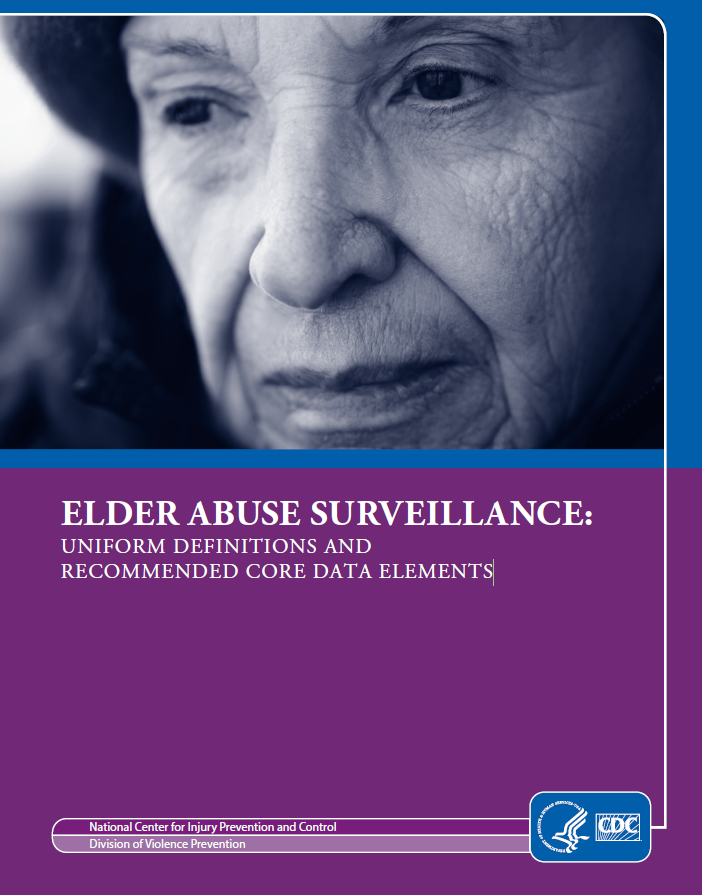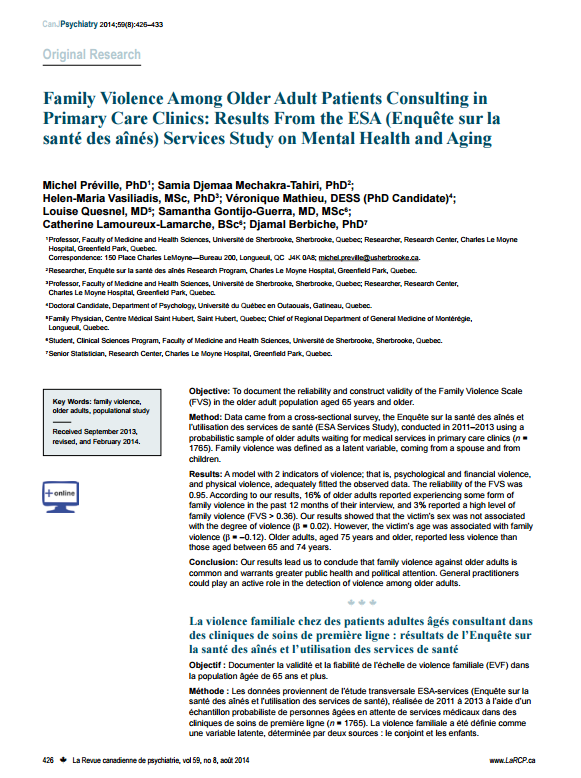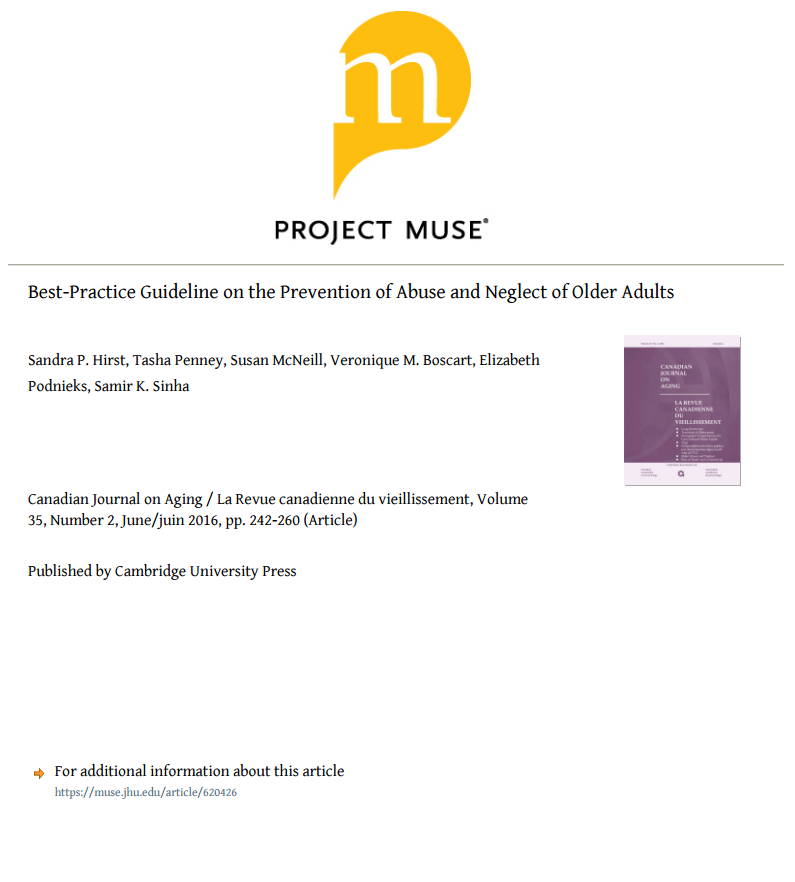Studies

(...)
The development and use of uniform definitions and recommended core data elements is an important first component of a larger process addressing data collection features that cause important discrepancies, gaps, and limitations in what is known about EA. Their use may move the EA prevention field closer to obtaining robust epidemiologic estimates which may provide a stronger basis for evaluating population level prevention/intervention strategies and setting prevention priorities.
As with the other CDC guidelines for uniform definitions and recommended data elements, this initial release of Elder Abuse Surveillance: Uniform Definitions and Recommended Core Data Elements, Version 1.0 is intended to serve as a starting point."
Source: Centers for Disease Control and Prevention
The following resource is part of the Family Violence Initiative, funded by the RCMP. Find similar tools by searching for the FVIF tag or consult the list of available resources.

"Family violence is a major public health problem, with important physical and mental health consequences for the victims. In Canada, since 1980, it is a crime.1 Family violence in the elderly is also an important problem because of its association with psychological distress,2,3 an increased use of health services4 and a high risk of mortality.5,6 However, few studies have also considered the issue among older women and men.3,7–16 The prevalence of family violence in older adults varies from one study to another. These inconsistencies may be related to differences in the sociocultural context of the populations studied or to methodological differences regarding the definition and measurement of family violence,3,17–20 which make it difficult to interpret results.4
Clinical Implications
- Our study provided evidence-based data on the prevalence of family violence in the elderly population waiting for health services in primary health services clinics.
- Our study documented the validity and reliability of the FVS which could be used in the elderly population waiting for health services in primary health services clinics.
- Our study gave estimates of unmet needs in the elderly population in primary health services clinics.
Limitations
- We used self-reported information from respondents.
- Clinical validity of the FVS is limited.
- Our sample was limited to the Quebec population"
Source: Canadian Journal of Psychiatry
The following resource is part of the Family Violence Initiative, funded by the Department of Justice Canada. Find similar tools by searching for the FVIF tag or consult the list of available resources.
Abstract: "The majority of older people who experience abuse are women, and to date, there have only been limited attempts to adequately consider this situation. It, therefore, seems appropriate to consider the links between domestic violence and elder abuse, including a clear focus on the likely role of gender within elder abuse. This will be achieved through the analysis of case material from situations the author was involved with over an 18 month period as a social work practitioner and manager. The paper aims to provide a brief overview of the status of current knowledge concerning elder abuse and neglect and to move to a consideration of factors from the field of domestic violence, including an analysis of case material. This will contribute to a greater understanding of the phenomena of elder abuse and neglect as they affect older women. It is intended that this will assist in the development of appropriate responses to protect older women who are abused or at risk of abuse and towards the eventual prevention of abuse."
Penhale, Bridget (1999) MSc and CQSW
The following resource is part of the Family Violence Initiative, funded by the Department of Justice Canada. Find similar tools by searching for the FVIF tag or consult the list of available resources.
Published by Oxford University Press on behalf of The Gerontological Society of America (Oxford Academic account required to access the full study)
"Purpose of the Study:
Elder mistreatment is an epidemic with significant consequences to victims. Little is known, however, about another affected group: nonabusing family members, friends, and neighbors in the lives of the older victim or “concerned persons.” This study aimed to identify (a) the prevalence of adults aged 18 and older who have encountered an elder mistreatment situation, (b) the proportion of these who helped the elder victim, and (c) the subjective levels of distress experienced by respondents who helped the victim versus those who did not."
By Risa Breckman, LCSW David Burnes, PhD; Sarah Ross, BA; Philip C. Marshall, MS; J. Jill Suitor, PhD; Mark S. Lachs, MD, MPH;Karl Pillemer, PhD
Source: The Gerontologist - Oxford Academic (Oxford Academic account required to access the full study)

Tasha Penney, Registered Nurses’ Association of Ontario
Susan McNeill, Registered Nurses’ Association of Ontario
Veronique M. Boscart, Conestoga College Institute of Technology and Advanced Learning
Elizabeth Podnieks, Ryerson University
Samir K. Sinha, Mt. Sinai Hospital, Toronto
RÉSUMÉ
"Une revue systématique de la littérature a été effectuée afin d’identifier des moyens efficaces pour prévenir et combattre l’abus et la négligence envers les adultes âgés dans les établissements de soins de santé au Canada. L’examen a été fait en utilisant les bases de données qui ont été recherchés à partir de janvier 2000 à avril / mai 2013. En outre, les membres des groupes d’experts ont présenté les citations d’articles tirés des archives personnelles. Deux associés de recherche infirmier (ARI) ont selectionné chaque titre et chaque résumé pour l’inclusion. Après le coefficient d’objectivité a été déterminé entre les ARI (score Kappa de 0,76), les dossiers ont été divisés, évalués et les données extraites indépendamment. L’examen a révélé 62 études portant sur l’identification, l’évaluation et la réponse à l’abus et la négligence des personnes âgées; stratégies d’éducation, de prévention et de promotion de la santé; et soutien organisationnel au niveau du système pour prévenir et combattre ce type de maltraitance et de négligence. L’abus et la négligence envers les aînés demeure peu exploré en termes d’études fondées sur des preuves; par conséquent, il faut davantage de recherche dans tous les domaines décrites."
Pour accéder au document entier: Project MUSE , Canadian Journal on Aging/ La Revue canadienne du vieillissement , 2016, Vol.35 (2)
Page 6 of 8
















